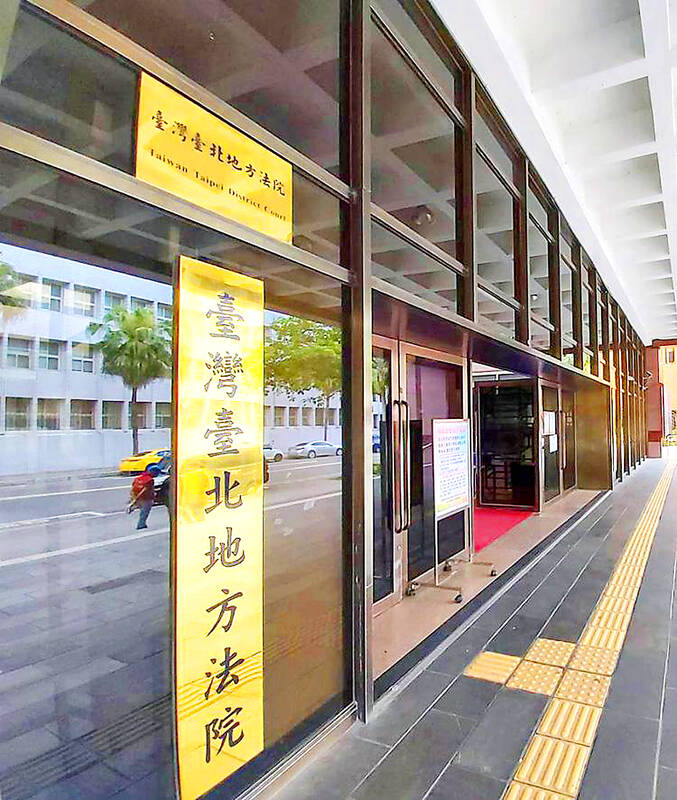The Taipei District Court on Monday sentenced Chang Kang-wei (張綱維), former chairman of the now-defunct Far Eastern Air Transport Corp (FAT, 遠東航空), to 14 years in prison after finding him guilty of embezzling corporate funds and other crimes.
He was also given another one-year sentence that can be commuted to a fine, said the court, which also ordered the confiscation of his illegal gains of NT$3 billion (US$94.23 million).
The decision can be appealed.

Photo: Chen Wei-tzu, Taipei Times
Chang was also indicted on charges of fraud, special breach of trust and contravening the Securities Exchange Act (證券交易法), all involving his use of the airline to finance personal businesses.
The airline had struggled financially from the 2000s to early 2020, when it ceased operations and had its air operator certificate revoked.
In 2008, FAT faced a financial crisis due to alleged illegal acts by another former chairman, Stephen Tsui (崔湧) and other executives, and filed a restructuring application with a local court, which was granted on Feb. 23 that year.
After FAT announced bankruptcy, Chang took over its management in 2009 by allegedly producing falsified financial statements of his own business conglomerate Huafu Enterprise Holdings Ltd (樺福集團) and saying it had sufficient funds to invest in FAT, the Taipei District Prosecutors’ Office indictment said.
After FAT emerged from bankruptcy restructuring in 2015, the airline quickly experienced a severe financial deficit the next year, in part due to Chang’s maneuvers, it said.
In October 2015, Chang negotiated a NT$1.3 billion loan at a 6.5 percent interest rate for FAT, but then allegedly transferred the funds to Huafu while leaving FAT saddled with the relatively high interest rate loan, the indictment said.
In addition, prosecutors said Chang negotiated a NT$2.2 billion loan for FAT from Taiwan Cooperative Bank in July 2016, which he allegedly used to pay off the NT$2.25 billion Huafu owed to Entie Commercial Bank.
He also allegedly continued to misappropriate more than NT$800 million in funds from FAT, they said.
Facing an audit of FAT’s accounts by the Civil Aviation Administration, Chang allegedly forged five receipts saying they were IOUs for funds lent by FAT to Huafu, they said.
Realizing that FAT was cash-strapped, the agency ordered it to recoup the NT$3.1 billion it was supposedly owed by outside parties.
Fearing that FAT would be fined by the agency and have its flight schedule disrupted, Chang bundled and transferred Huafu’s “Xiaopingding” property development project in Tamsui to the airline, to satisfy the agency’s request and offset the NT$3.1 billion of receivables in FAT’s accounts, they said.
Chang knew that sales of the project’s units were sluggish, they said.
As a result, the airline took over a large number of unfinished buildings and a real-estate project that was difficult to develop and incurred significant losses, prosecutors said.

SHIPS, TRAINS AND AUTOMOBILES: The ministry has announced changes to varied transportation industries taking effect soon, with a number of effects for passengers Beginning next month, the post office is canceling signature upon delivery and written inquiry services for international registered small packets in accordance with the new policy of the Universal Postal Union, the Ministry of Transportation and Communications said yesterday. The new policy does not apply to packets that are to be delivered to China, the ministry said. Senders of international registered small packets would receive a NT$10 rebate on postage if the packets are sent from Jan. 1 to March 31, it added. The ministry said that three other policies are also scheduled to take effect next month. International cruise ship operators

NUMBERS IMBALANCE: More than 4 million Taiwanese have visited China this year, while only about half a million Chinese have visited here Beijing has yet to respond to Taiwan’s requests for negotiation over matters related to the recovery of cross-strait tourism, the Tourism Administration said yesterday. Taiwan’s tourism authority issued the statement after Chinese-language daily the China Times reported yesterday that the government’s policy of banning group tours to China does not stop Taiwanese from visiting the country. As of October, more than 4.2 million had traveled to China this year, exceeding last year. Beijing estimated the number of Taiwanese tourists in China could reach 4.5 million this year. By contrast, only 500,000 Chinese tourists are expected in Taiwan, the report said. The report

Temperatures are forecast to drop steadily as a continental cold air mass moves across Taiwan, with some areas also likely to see heavy rainfall, the Central Weather Administration (CWA) said. From today through early tomorrow, a cold air mass would keep temperatures low across central and northern Taiwan, and the eastern half of Taiwan proper, with isolated brief showers forecast along Keelung’s north coast, Taipei and New Taipei City’s mountainous areas and eastern Taiwan, it said. Lows of 11°C to 15°C are forecast in central and northern Taiwan, Yilan County, and the outlying Kinmen and Lienchiang (Matsu) counties, and 14°C to 17°C

STEERING FAILURE: The first boat of its class is experiencing teething issues as it readies for acceptance by the navy, according to a recent story about rudder failure The Hai Kun (海鯤), the nation’s first locally built submarine, allegedly suffered a total failure of stern hydraulic systems during the second round of sea acceptance trials on June 26, and sailors were forced to manually operate the X-rudder to turn the submarine and return to port, news Web site Mirror Daily reported yesterday. The report said that tugboats following the Hai Kun assisted the submarine in avoiding collisions with other ships due to the X-rudder malfunctioning. At the time of the report, the submarine had completed its trials and was scheduled to begin diving and surfacing tests in shallow areas. The X-rudder,